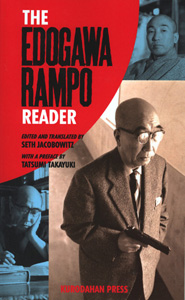Japanese crime scribe's popularity returns
April 6, 2009 -- Empty amusement parks, narrow alleys, public toilets and the attics of Tokyo boarding houses are the territory of Japanese detective writer Edogawa Rampo. The early 20th century writer's work has enjoyed a revival with stage and screen adaptations and a new collection of writings translated by Seth Jacobowitz, assistant professor of humanities.

Seth Jacobowitz's translations include the first English translations of Rampo's essays in this new anthology.
"The Edogawa Rampo Reader" contains the first English translations of Rampo's essays. Jacobowitz suggests that the renewed interest in this author's work is due to the cultural and economic parallels between Japan in the early part of the last century and today.
"In the 1920s and 30s, Japan and the U.S. were experiencing an economic depression," said Jacobowitz, who maintains that the depression bred paranoia, a key ingredient of detective novels.
From femme fatales and voyeurs to drug addicts and murderers, Rampo focused on the erotic and grotesque. His observations spilled onto the pages of his fiction as the thoughts of often desperate, yet painfully observant characters. Jacobowitz uses Rampo's essays and fiction in his humanities classes on Japanese history, culture, language and literature.
"His fiction reveals hundreds of facets to Japanese society and the culture of the time," Jacobowitz said. "Rampo witnessed the mingling of the avant-garde and mass culture and expressed the tensions that arose over the rapid assimilation of capitalism, nationalism, industrialization and empire building."
Edogawa Rampo, a household name in Japan, is the pen name of Hirai Taro, who was born in 1894 and wrote most of his fiction prior to World War II. He and his American and British contemporaries advanced the detective fiction genre after its invention by Edgar Allen Poe a century earlier. The Japanese writer's devotion to Poe is reflected in his pseudonym, chosen because it phonetically mimicked "Edgar Allen Poe." In Japanese, Edogawa means Edo River and Rampo means wild/chaotic and walk. However, Jacobowitz prefers the more elegant "rambler of the Edo River."
Like the ramblers in his fiction, Rampo spent a lot of time wandering through Tokyo. In one of his most famous stories, "The Stalker in the Attic," amateur detective Akechi Kogoro shadows a cross-dressing voyeur planning a murder. The following is an excerpt:
…besides the thrill of peeping, there were often comical, sad, and sometimes incredible spectacles transpiring below. There was a company employee with a penchant for fiery anti-capitalist rants who kept taking out the pay raise letter he'd just received from his briefcase when no one was around and then putting it back, reading it countless times with unabated pleasure. There was a certain stockjobber who wore his best kimono as everyday attire and put on airs of a vainglorious millionaire, but just before bed he would take off the kimono he'd worn so casually during the daytime, and not only did he fastidiously fold it up and place it under his futon like a girl, whenever he saw a spot he'd assiduously lick it with his mouth…
-- "The Edogawa Rampo Reader," Seth Jacobowitz, translator and editor, (Kurodahan Press, 2008). Excerpt reprinted by permission of the publisher.
Share this story:
